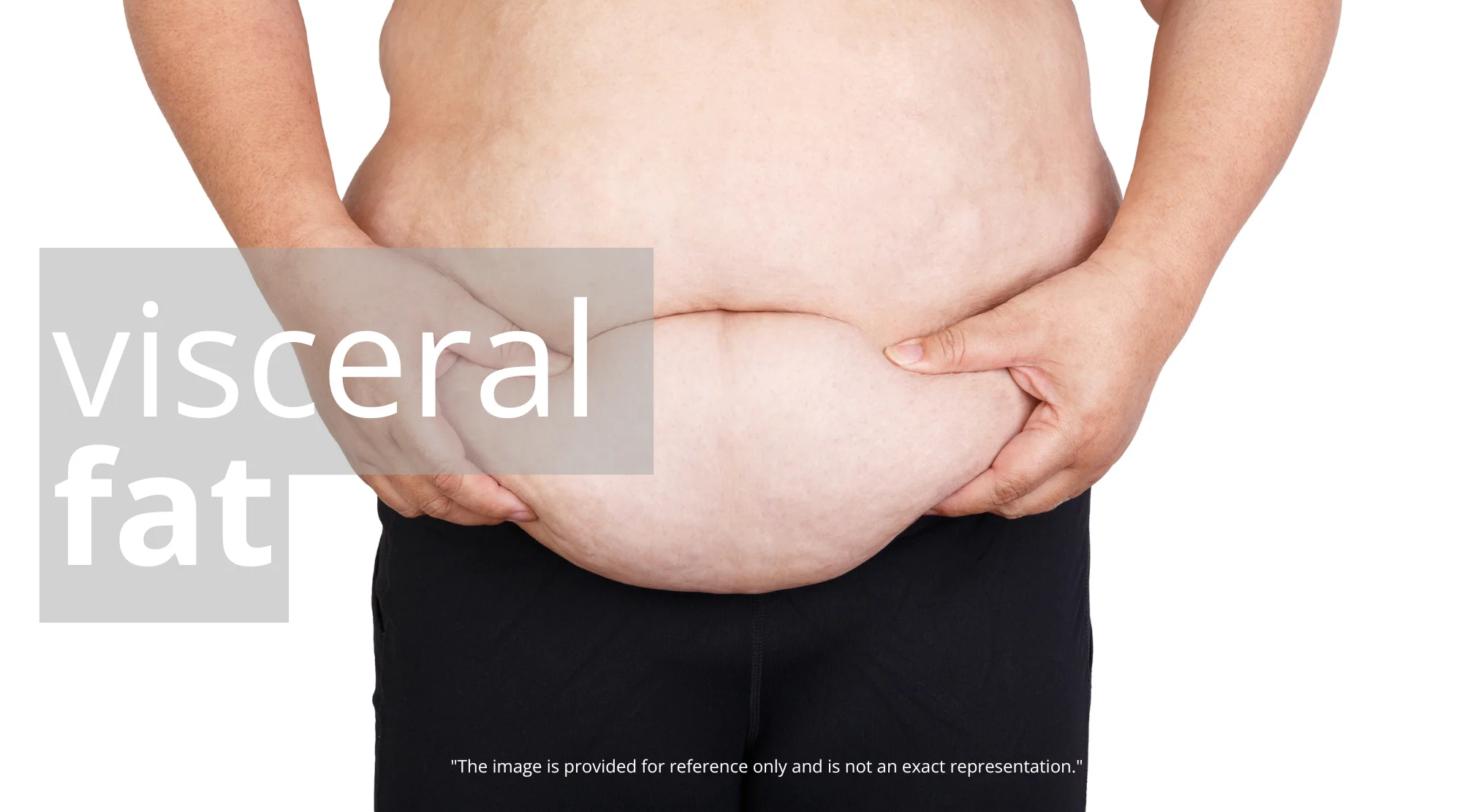Is Your Belly Fat Increasing Your Cancer Risk? What Women Need to Know
Emerging research suggests a concerning link between deep belly fat, also known as visceral fat, and the aggressiveness of certain cancers, particularly in women. While maintaining a healthy weight is crucial for overall well-being, understanding the specific dangers of visceral fat is essential for proactive health management. This article delves into the latest findings, explores the mechanisms behind this connection, and provides actionable steps you can take to reduce your risk. Understanding how belly fat and cancer risk are intertwined could be life-saving.

Understanding Visceral Fat and Its Dangers
Visceral fat isn’t just the subcutaneous fat you can pinch; it’s the dangerous fat that surrounds your abdominal organs deep inside your body. It’s metabolically active, meaning it releases hormones and inflammatory substances that can disrupt normal bodily functions. While some body fat is necessary for energy storage and hormone production, excessive visceral fat has been linked to a host of health problems, including heart disease, type 2 diabetes, and now, potentially, certain cancers.
Visceral fat differs from subcutaneous fat, which lies just beneath the skin. Subcutaneous fat is more visible and palpable, while visceral fat is hidden deep within the abdominal cavity. This “hidden” nature makes it particularly dangerous, as many people may not realize they have high levels of visceral fat until health problems arise.
The Link Between Visceral Fat and Cancer: New Research Insights
Recent studies have shed light on the connection between visceral fat and cancer, particularly endometrial cancer, a type of cancer that begins in the lining of the uterus. These studies suggest that the metabolic activity of visceral fat can promote the growth and spread of cancer cells. The inflammatory substances released by visceral fat can create an environment that is conducive to tumor development and progression.
Researchers are using advanced imaging techniques like PET/CT scans to analyze the metabolic activity of visceral fat and its impact on cancer aggressiveness. These studies have revealed that women with higher levels of metabolically active visceral fat tend to have more aggressive forms of endometrial cancer. This underscores the importance of addressing visceral fat as a potential risk factor for certain cancers.
How Visceral Fat Fuels Cancer Growth
The mechanisms by which visceral fat promotes cancer growth are complex and multifaceted. One key factor is the release of inflammatory substances, such as cytokines, which can stimulate cancer cell proliferation and inhibit apoptosis (programmed cell death). Visceral fat also releases hormones like estrogen, which can fuel the growth of hormone-sensitive cancers like breast and endometrial cancer.
Furthermore, visceral fat can interfere with the body’s ability to regulate blood sugar and insulin levels. This can lead to insulin resistance, a condition in which the body’s cells become less responsive to insulin. Insulin resistance has been linked to an increased risk of several types of cancer, including colon, breast, and pancreatic cancer. By understanding these mechanisms, we can develop targeted strategies to reduce the cancer-promoting effects of visceral fat. This is discussed further in our article on AI powered cancer treatment: A new era of precision medicine: https://befullbehealth.com/2025/ai-powered-cancer-treatment-a-new-era-of-precision-medicine/
Assessing Your Visceral Fat Levels
Unlike subcutaneous fat, visceral fat is not easily measured with a simple skin-fold test. However, there are several ways to assess your visceral fat levels. A common method is to measure your waist circumference. A waist circumference of more than 35 inches for women and 40 inches for men is considered an indicator of excess visceral fat.
Advanced imaging techniques like CT scans and MRIs can provide a more precise measurement of visceral fat. However, these tests are typically not necessary unless there is a specific medical reason to evaluate visceral fat levels. A healthcare provider can help you determine the most appropriate method for assessing your visceral fat levels based on your individual risk factors and health history.
Lifestyle Changes to Reduce Visceral Fat and Cancer Risk
The good news is that visceral fat is often more responsive to lifestyle changes than subcutaneous fat. A combination of diet and exercise can be highly effective in reducing visceral fat and lowering your cancer risk.
- Diet: Focus on a whole-foods, plant-based diet rich in fruits, vegetables, and whole grains. Limit processed foods, sugary drinks, and unhealthy fats. Consider incorporating anti-inflammatory foods like fatty fish, berries, and leafy greens. Read more about anti-inflammatory diets: https://befullbehealth.com/2025/anti-inflammatory-diets-do-they-really-work-the-science-backed-truth/
- Exercise: Engage in regular physical activity, including both aerobic exercise (like running, swimming, or cycling) and strength training. Aim for at least 150 minutes of moderate-intensity aerobic exercise or 75 minutes of vigorous-intensity aerobic exercise per week.
- Stress Management: Chronic stress can contribute to visceral fat accumulation. Practice stress-reducing techniques like meditation, yoga, or spending time in nature.
- Sleep: Aim for 7-8 hours of quality sleep per night. Poor sleep can disrupt hormone balance and increase visceral fat storage.
The Role of Diet in Combating Visceral Fat
Specific dietary choices can significantly impact visceral fat levels. Emphasize foods that promote satiety and reduce inflammation.
- Fiber-Rich Foods: High-fiber foods like oats, beans, and lentils can help regulate blood sugar levels and reduce visceral fat. Check out our guide to daily fiber intake: https://befullbehealth.com/2025/fiber-intake-how-much-do-you-really-need-daily/
- Lean Protein: Protein helps preserve muscle mass, which is essential for maintaining a healthy metabolism and burning fat. Choose lean protein sources like fish, chicken, and beans. Consider foods with more protein than chicken for a powerhouse of nutrition: https://befullbehealth.com/2025/protein-powerhouses-foods-with-more-protein-than-chicken/
- Healthy Fats: Incorporate healthy fats like those found in avocados, nuts, and olive oil. Avoid trans fats and limit saturated fats.
- Limit Added Sugars: Sugary drinks and processed foods are major contributors to visceral fat. Reduce your intake of these items as much as possible.
Exercise Strategies for Targeting Visceral Fat
Exercise is a powerful tool for reducing visceral fat. Aerobic exercise burns calories and improves insulin sensitivity, while strength training builds muscle mass, which helps boost metabolism.
- Aerobic Exercise: Activities like brisk walking, running, cycling, and swimming are all effective for burning visceral fat.
- Strength Training: Lifting weights or doing bodyweight exercises can help build muscle mass and increase your metabolic rate.
- High-Intensity Interval Training (HIIT): HIIT involves short bursts of intense exercise followed by brief recovery periods. This type of exercise can be particularly effective for reducing visceral fat.
Medical Interventions and When to Consider Them
In some cases, lifestyle changes alone may not be enough to reduce visceral fat to a healthy level. Medical interventions, such as medications or surgery, may be considered in certain situations.
- Medications: Some medications, such as metformin, can help improve insulin sensitivity and reduce visceral fat.
- Weight Loss Surgery: Bariatric surgery may be an option for individuals with severe obesity and high levels of visceral fat.
It’s important to discuss your options with a healthcare provider to determine the most appropriate course of treatment based on your individual circumstances.
Staying Informed and Proactive About Your Health
The link between visceral fat and cancer is an area of ongoing research. Staying informed about the latest findings and taking proactive steps to manage your visceral fat levels can help reduce your risk of certain cancers and improve your overall health.
Regular check-ups with your healthcare provider are essential for monitoring your health and identifying any potential risk factors. Talk to your doctor about your concerns and ask about strategies for managing your visceral fat levels.
Taking control of your health by addressing visceral fat can be a powerful step towards preventing cancer and promoting long-term well-being. By embracing a healthy lifestyle that includes a balanced diet, regular exercise, and stress management, you can significantly reduce your risk and live a healthier, more fulfilling life.











Post Comment